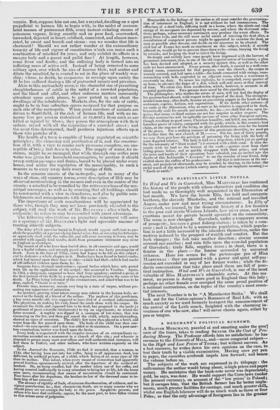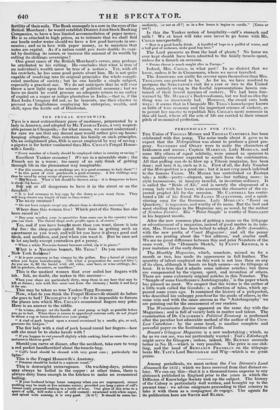A MERCHANT'S POLITICAL ECONOMY.
A BRITISH MERCHANT, puzzled at and smarting under the presl sure of the times, takes to reading SENIOR On the Cost of Pro- dating Money. The Professor affords him no satisfaction: he has recourse to the Elements of MILL, and—more congenial subject— to the High and Low Prices of TOOKE; but without success. As a last resource, he writes down his own opinions on the case, to test their truth by a visible examination. Having once put pen to paper, the cacoethes scribendi impels him forward; and hence the volume before us. . The subjects of the work are expressed in its titlepage : the millennium the author would bring about, ishigh prices endpaper money. He maintains that the bank-note never was depreciated; gold, he says, was dear. He would support the Corn-laws (under. the present currency), on account of the "low prices" in Poland; but it escapes him, that the British farmer has far better imple- ments, much greater facilities for carriage, and much greater skill, whilst one English labourer will do as much work as three or four Poles; so that the only advantage of foreigners lies in the greater. fertility of their soils. The Bank monopoly is a sore in the eyes of the British Merchant : he would establish District Joint Stock Banking Companies, to have a less limited accommodation of paper money. He is so attached to high prices, as to intimate that we shall find our heads under water should we have a few good harvests in suc- cession; and so in love -with paper money, as to maintain that notes are capital. As if a nation could pro Santo double its capi- tal by doubling its issues, or increase the amount of its wealth by calling its shillings sovereigns!
One great cause of the British Merchant's errors, may perhaps be attributed to his calling. He concludes that what is true of an individual's wealth must be true of a nation's. Yet, with all his crotchets, he has some good points about him. He is not quite capable of resolving into its original principles the whole compli- cated machine of society ; but he can handle a single subject, especially a practical one. We do not anticipate that he will ever throw a new light upon the science of political economy; but we have no doubt he could procure an adequate return to an outlay of capital on a sugar or indigo plantation in India,—that is, if the East India Company did not, as he laments, use their charter to prevent an Englishman employing his enterprise, wealth, and skill, upon the fertile soil of Hindostan.



























 Previous page
Previous page